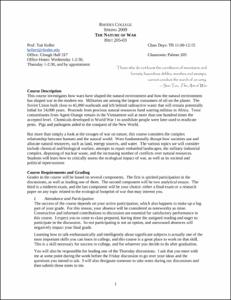Please use this identifier to cite or link to this item:
http://hdl.handle.net/10267/3297| Title: | HIST 205-03, The Nature of War, Spring 2009 |
| Authors: | Keller, Tait |
| Keywords: | History, Department of;Syllabus;Curriculum;Academic departments;Text;2009 Spring |
| Issue Date: | 14-Jan-2009 |
| Publisher: | Memphis, Tenn. : Rhodes College |
| Series/Report no.: | Syllabi CRN 29313 |
| Abstract: | This course investigates how wars have shaped the natural environment and how the natural environment has shaped war in the modern era. Militaries are among the largest consumers of oil on the planet. The Soviet Union built close to 45,000 warheads and left behind radioactive waste that will remain potentially lethal for 24,000 years. Proceeds from precious natural resources fund warring militias in Africa. Toxic contaminants from Agent Orange remain in the Vietnamese soil at more than one hundred times the accepted level. Chemicals developed in World War I to annihilate people were later used to eradicate pests. Pigs and pathogens aided in the conquest of the New World. But more than simply a look at the ravages of war on nature, this course considers the complex relationship between humans and the natural world. Wars fundamentally disrupt how societies use and allocate natural resources, such as land, energy sources, and water. The various topics we will consider include chemical and biological warfare, attempts to repair embattled landscapes, the military-industrial complex, disposing of nuclear waste, and the increasing number of conflicts over natural resources. Students will learn how to critically assess the ecological impact of war, as well as its societal and political repercussions. |
| Description: | This syllabus was submitted to the Office of Academic Affairs by the course instructor |
| URI: | http://hdl.handle.net/10267/3297 |
| Appears in Collections: | Course Syllabi |
Files in This Item:
| File | Description | Size | Format | |
|---|---|---|---|---|
| 2009_spring_HIST_205-03_29313.pdf | 180.06 kB | Adobe PDF |  View/Open |
Items in DSpace are protected by copyright, with all rights reserved, unless otherwise indicated.